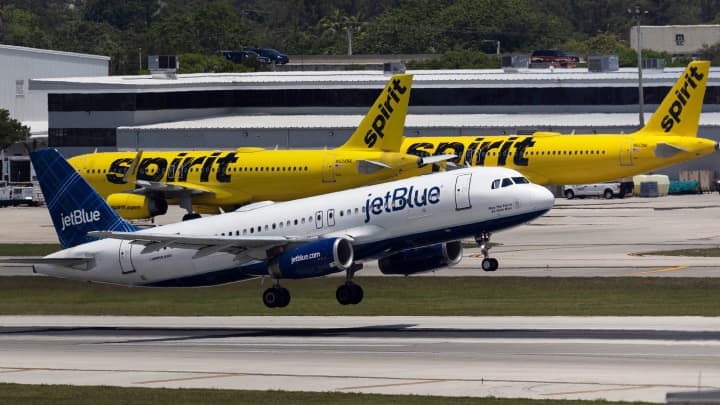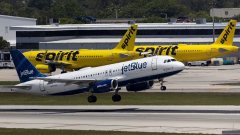
stock tumbled to a nearly 12-year low Tuesday as the company forecast a loss for the fourth quarter and heads to court to its acquisition of budget carrier , a purchase it argues is crucial to its future.
Shares fell more than 10% Tuesday to $3.76 apiece. Spirit shares fell more than 12% to a three-year low.
The U.S. Department of Justice to block JetBlue's $3.8 billion all-cash purchase of Spirit, a deal the airline reached with the discounter in 2022 after a bidding war with rival .
The deal would create the fifth-largest airline in the U.S. JetBlue argued it needs to buy Spirit to grow and better compete with giant carriers — , , and — which control about three-quarters of the U.S. market and are products of megamergers themselves.
The Justice Department, however, alleges that "the proposed transaction will increase fares and reduce choice on routes across the country, raising costs for the flying public and harming cost-conscious fliers most acutely."
JetBlue from Spirit's bright-yellow planes and outfit them with seatback screens to match JetBlue's interiors. Spirit's business model is based on packed planes, no-frills fares and fees for everything from seat assignments to carry-on luggage, while JetBlue has more amenities and fewer seats on board.
The lawsuit is a test for President Joe Biden's Justice Department, which has antitrust cases with mixed results in the airline, health-care and publishing industries, among others.
The trial starts Tuesday and is set to last about three weeks in U.S. District Court in Boston.
In May, the Justice Department to undo a partnership between JetBlue and American Airlines in the Northeast, an alliance the airlines started in the summer. At the time, JetBlue said it would on acquiring Spirit, a deal it expects to close early next year.
JetBlue to pay a reverse breakup fee of $70 million and another $400 million to Spirit shareholders if regulators successfully block the deal.
The JetBlue-Spirit merger would be the first among major U.S. airlines since and Virgin America combined in 2016.
Neither JetBlue nor Spirit are on solid footing. Fuel prices have climbed along with other costs, just as red-hot post-pandemic growth in travel demand has eased and fares have dropped, depriving carriers of revenue when they need it to cover expenses.
JetBlue on Tuesday posted third-quarter that came in below analysts' estimates. The airline reported an adjusted loss per share of 39 cents on revenue of $2.35 billion, underperforming an expected loss per share of 25 cents and revenue of $2.38 billion, according to consensus estimates compiled by LSEG, formerly known as Refinitiv.
"While we have been able to offset some of the costs associated with the challenging operational backdrop, the sheer magnitude of the air traffic control and weather-related delays has been staggering," CFO Ursula Hurley said in an earnings release.
JetBlue also forecast an adjusted loss for the fourth quarter and the full year, guiding to an adjusted loss of between 35 cents and 55 cents in the last three months of the year.
Spirit Airlines, meanwhile, said it will have little if any capacity growth next year as it grapples with slower demand and a engine issue.
The budget airline told staff it will pause new-hire flight attendant and pilot training next month,
JetBlue said it would not answer any questions about the acquisition on the earnings call Tuesday.
Don't miss these CNBC PRO stories:




